Recipients
The following organisations were awarded this year. [1]
- Alenco Flex, Brimsdown, Enfield. Plastics. Received by Vincent Campbell, Deputy Managing Director 1979
- Aquascutum
The Queen's Award for Enterprise: International Trade (Export) (1979) was awarded on 21 April 1979, by Queen Elizabeth II.
The following organisations were awarded this year. [1]
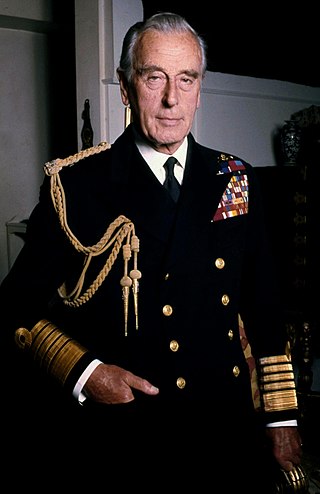
Albert Victor Nicholas Louis Francis Mountbatten, 1st Earl Mountbatten of Burma was a British naval officer, colonial administrator and close relative of the British royal family. Mountbatten, who was of German descent, was born in the United Kingdom to the prominent Battenberg family. He was a maternal uncle of Prince Philip, Duke of Edinburgh, and a second cousin of King George VI. He joined the Royal Navy during the First World War and was appointed Supreme Allied Commander, South East Asia Command, in the Second World War. He later served as the last viceroy of British India and briefly as the first governor-general of the Dominion of India.
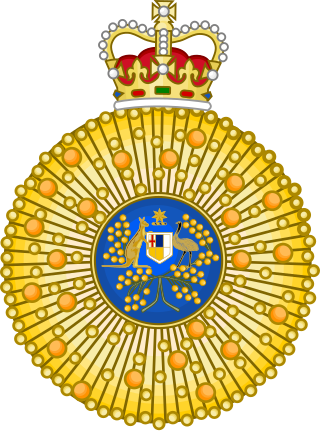
The Order of Australia is an honour that recognises Australian citizens and other persons for outstanding achievement and service. It was established on 14 February 1975 by Elizabeth II, Queen of Australia, on the advice of the Australian Government. Before the establishment of the order, Australian citizens received British honours.

The Distinguished Flying Cross (DFC) is the third-level military decoration awarded to officers, and since 1993 to other ranks, of the United Kingdom's Royal Air Force and other services, and formerly to officers of other Commonwealth countries, for "an act or acts of valour, courage or devotion to duty whilst flying in active operations against the enemy".
The George Cross (GC) is the highest award bestowed by the British government for non-operational gallantry or gallantry not in the presence of an enemy. In the British honours system, the George Cross, since its introduction in 1940, has been equal in stature to the Victoria Cross, the highest military gallantry award. It is awarded "for acts of the greatest heroism or for most conspicuous courage in circumstance of extreme danger", not in the presence of the enemy, to members of the British armed forces and to British civilians. Posthumous awards have been allowed since it was instituted. It was previously awarded to residents of Commonwealth countries, most of which have since established their own honours systems and no longer recommend British honours. It may be awarded to a person of any military rank in any service and to civilians including police, emergency services and merchant seamen. Many of the awards have been personally presented by the British monarch to recipients or, in the case of posthumous awards, to next of kin. The investitures are usually held at Buckingham Palace.
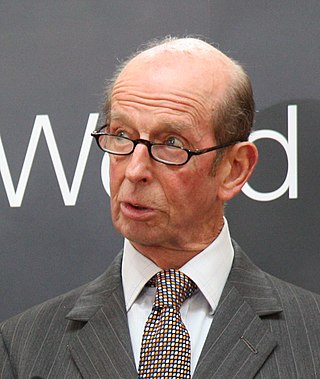
Prince Edward, Duke of Kent, is a member of the British royal family. Queen Elizabeth II and Edward were first cousins through their fathers, King George VI, and Prince George, Duke of Kent. Edward's mother Princess Marina of Greece and Denmark was also a first cousin of the Queen's husband Prince Philip, Duke of Edinburgh, making him both a second cousin and first cousin once removed to King Charles III. He is currently 40th in the line of succession to the British throne.

The Distinguished Service Order (DSO) is a military decoration of the United Kingdom, as well as formerly of other parts of the Commonwealth, awarded for meritorious or distinguished service by officers of the armed forces during wartime, typically in actual combat. Since 1993 it has been awarded specifically for 'highly successful command and leadership during active operations', with all ranks being eligible.

The Royal Victorian Order is a dynastic order of knighthood established in 1896 by Queen Victoria. It recognises distinguished personal service to the British monarch, Canadian monarch, Australian monarch, or New Zealand monarch, members of the monarch's family, or to any viceroy or senior representative of the monarch. The present monarch, King Charles III, is the sovereign of the order. The order's motto is Victoria. The order's official day is 20 June. The order's chapel is the Savoy Chapel in London.

The Distinguished Conduct Medal was a decoration established in 1854 by Queen Victoria for gallantry in the field by other ranks of the British Army. It is the oldest British award for gallantry and was a second level military decoration, ranking below the Victoria Cross, until it was discontinued in 1993 when it was replaced by the Conspicuous Gallantry Cross. The medal was also awarded to non-commissioned military personnel of other Commonwealth Dominions and Colonies.

Edward Richard Holmes, CBE, TD, JP, VR, known as Richard Holmes, was a British military historian. He was co-director of Cranfield University's Security and Resilience Group from 1989 to 2009 and became Professor of Military and Security Studies at Cranfield in 1995.

The Military Cross (MC) is the third-level military decoration awarded to officers and other ranks of the British Armed Forces, and formerly awarded to officers of other Commonwealth countries.
Brigadier Andrew Henry Parker Bowles is a retired British Army officer. He is the former husband of Queen Camilla of the United Kingdom, consort of King Charles III.

The King's Police Medal (KPM) is awarded to police in the United Kingdom for gallantry or distinguished service. It was also formerly awarded within the wider British Empire, including Commonwealth countries, most of which now have their own honours systems. The medal was established on 7 July 1909, initially inspired by the need to recognise the gallantry of the police officers involved in the Tottenham Outrage. Renamed the King's Police and Fire Services Medal (KPFSM) in 1940, it was replaced on 19 May 1954 by the Queen's Police Medal (QPM), when a separate Queen's Fire Service Medal was also instituted. The current award was renamed the King's Police Medal following the death of Queen Elizabeth II in 2022 and the accession of King Charles III to the throne of the United Kingdom.
General Sir Frank Edward Kitson, is a retired British Army officer and writer on military subjects, notably low intensity operations. He rose to be Commander-in-Chief UK Land Forces from 1982 to 1985 and was Aide-de-Camp General to Queen Elizabeth II from 1983 to 1985.
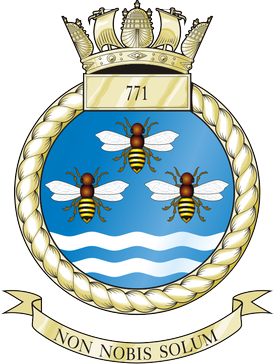
771 Naval Air Squadron of the Fleet Air Arm was formed on 24 May 1939 at Lee-on-Solent as a Fleet Requirements Unit with 14 Fairey Swordfish TSR biplanes. The Squadron carried out various exercises with ships and provided towed targets for naval air gunners and was decommissioned on 22 March 2016.
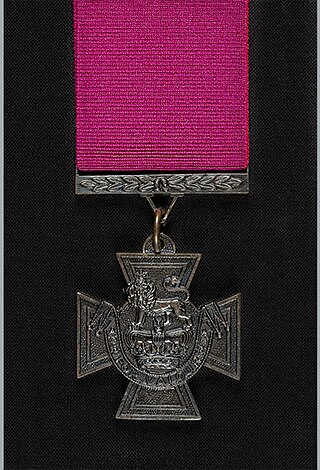
The Victoria Cross (VC) is the highest and most prestigious award of the British honours system. It is awarded for valour "in the presence of the enemy" to members of the British Armed Forces and may be awarded posthumously. It was previously awarded by countries of the Commonwealth of Nations, most of which have established their own honours systems and no longer recommend British honours. It may be awarded to a person of any military rank in any service and to civilians under military command. No civilian has received the award since 1879. Since the first awards were presented by Queen Victoria in 1857, two-thirds of all awards have been personally presented by the British monarch. The investitures are usually held at Buckingham Palace.
The Overseas Territories Police Medal (OTPM), known as the Colonial Police Medal (CPM) until April 2012, is a medal awarded for gallantry or distinguished service to all ranks of police forces and organised fire brigades in British Overseas Territories, and formerly in Crown Colonies and British Dependent Territories. Police officers in these areas can also be awarded the higher ranking King's Police Medal. The CPM was first awarded in 1938.
The Queen's Award for Enterprise: Innovation (Technology) (1979) was awarded on 21 April 1979, by Queen Elizabeth II.

The King's Awards for Enterprise, previously known as The Queen's Awards for Enterprise, is an awards programme for British businesses and other organizations who excel at international trade, innovation, sustainable development or promoting opportunity. They are the highest official UK awards for British businesses. The scheme was established as The Queen's Award to Industry by a royal warrant of 30 November 1965, and awards are given for outstanding achievement by UK businesses in the categories of innovation, international trade, sustainable development and promoting opportunity through social mobility.
The 1986 Special Honours in New Zealand were two Special Honours Lists: the first was dated 27 February 1986 and made one appointment to the Queen's Service Order; and the second was dated 31 July 1986, in which six people were awarded the Polar Medal, for good services as members of New Zealand expeditions to Antarctica in recent years.